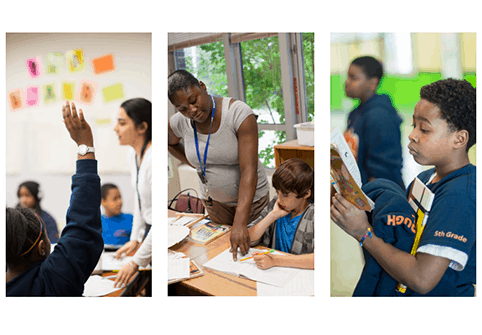Rand Study Says Personalized Learning Boosts Academic Gains

A two year Rand study of 23 public charter schools indicated that, “Students are making significantly greater gains in math and reading over the last two years than a virtual control group made up of similar students at comparable schools.”
The Gates Foundation funded report defined personalized learning as an, “Approach in which teachers and schools create systems, tools, and methodologies that tailor instruction to the individual needs, skills, and interests of each student, in an effort to accelerate and deepen their learning.”
The schools were supported by Next Generation Learning Challenge and the Charter School Growth Fund. The next phase will include 29 more schools.
Studied schools are adopting similar practices including (also noted are relevant recent papers on each topic):
- Learner profiles: Teachers have an up-to-date record that provides a deep understanding of each student’s individual strengths, needs, motivations, progress, and goals to help inform his or her learning. (See Data Backpack: Portable Records & Learner Profiles)
- Personal learning paths: All students are held to high expectations, but each student follows a customized path that responds and adapts based on his or her learning progress, motivations, and goals. (See Core & More: Guiding and Personalizing College & Career Readiness)
- Competency-based progression: Each student’s progress toward clearly-defined goals are continually assessed. A student advances and earns course credit (if applicable) as soon as they demonstrate an adequate level of mastery. (See From Cohorts to Competency)
- Flexible learning environments: Student needs drive the design of the learning environment. All operational elements–staffing plans, space utilization, and time allocation–respond and adapt to support students in achieving their goals. (See Blended Learning Implementation Guide)
All of these schools are focused on preparing students, “For the Common Core State Standards and the critical-thinking and problem-solving skills students will need to persist and succeed in college and careers.”
As outlined at Opportunity Culture, most next gen schools are, “Creating new roles and opportunities for teachers, who have been deeply engaged in the design of such schools.”
Researchers also found, “Positive developments in the schools’ environments, including positive perceptions among teachers about professional development, working conditions, and access to and use of technology that were conducive to implementing personalized learning practices.”
One consistent behavior between teachers was frequent use of data. Technology was used extensively in most observed schools but, “Use varied widely even within the same school.”
These positive results aren’t surprising. Fifteen years ago we personalized by creating small learning environments. These days, as NGLC grantmaker Andy Calkins explains, next generation learning is blended, personalized, and competency-based. As the studied schools indicate, the potential of using new tools to create personalized learning environments improves every month.
For more see:
- How Digital Learning is Boosting Achievement, compendium of evidence
- Next Gen Schools that are Leading the Way, the story of 14 founding teams







0 Comments
Leave a Comment
Your email address will not be published. All fields are required.